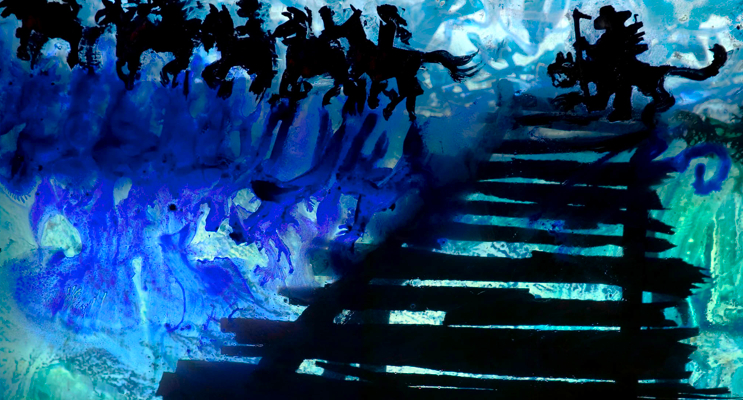By Joe Bendel. At its best, animation creates a stylized world to express the truth of the very real world around us. Several of the award-winning animated shorts recently collected by The World According to Shorts do exactly that. Titled Nine Nation Animation, the mostly very strong animated shorts program (see showreel above) now traveling to art house theaters nationwide.
Starting strong, Nine kicks off with Kajsa Naess’s Deconstruction Workers from Norway. Employing actual photos of actors animated against a chaotic construction site, Deconstruction certainly has a distinctive look. Yet had screenwriter Kjartan Helleve’s caustic dialogue about life and relationships been produced in a live action film, it would still be quite funny – which is, indeed, the ultimate test of an animated film. It is followed by Burkay Dorgan’s Average 40 Matchsticks, representing Turkey. Its stop motion animation would be impressive in a show-reel, but it is rather a trifle within the overall program.
Easily the richest, most substantial work in Nine is French animator Patrick Pleutin’s Bâmiyân (available below, in French only). Told through multiple narrators, Bâmiyân first follows a Chinese monk on his 632 AD pilgrimage to view the great Buddha statues of Bamyan. Eventually, the first child storyteller is interrupted by a second who glorifies the statues’ destruction centuries later at the hands of the Taliban. It is a chilling illustration of Islamist intolerance learned at an early age. Bâmiyân’s visual style is also quite dramatic, evoking not just traditional Tibetan, Chinese, and Indian art forms, but even hinting at the ancient cave paintings of Lascaux. Indeed, Nine is worth seeing for Bâmiyân alone, but it is followed by two more quite rewarding films.

If Philip K. Dick had rewritten Adam Sandler’s Click with the Hello Kitty characters and set it in the world of Tron, it might resemble David O’Reilly’s Berlinale Golden Bear winning Please Say Something. Obviously, that is worth seeing. It is a bit of a surprise Belgian Jonas Geirnaert’s Flatlife won the Cannes Jury Prize, because this cross-section view of life in four contiguous apartments is very funny, but not the least bit political. Though easily the most sentimental, Robert Bradbrook’s Home Road Movies might be the most innovative, manipulating images of British actor Bill Paterson (recognizable from Comfort and Joy, Smiley’s People, and a host of other credits), appearing as the filmmaker’s late father, to create a tangible sense of pathos.
There are the occasional misfires. Veljko Popoviç’s She Who Measures is an ugly-looking, predictable, didactic screed against commercialism. The South African Blackheart Group’s dodo bird fable The Tale of How is impressively baroque, but the operatic narration makes it nearly impossible to follow. A collection in itself, the concluding Never Like the First Time dramatizes three Swedes relating their first sexual experience. Though uneven, it has its moments, including the harrowing middle story of a young woman that serves as a cautionary tale and something of a corrective to the Maxim-esque episode that preceded it.
Happily, this is not an assemblage of Benetton’s commercials or UNICEF infomercials. Nine simply collects some of the best animated shorts around the world as determined by World According to Shorts’ rather eccentric aesthetic judgment. Indeed, their overall record here is quite good, picking one film of true distinction, three high passes, and two mixed bags that are still rather good on balance. That is a far better batting average than you get with most festival short programming blocks. Well worth seeing, Nine just ended its week long run in New York at the IFC Center and now travels to art house theaters across the country.
Posted on October 6th, 2010 at 9:08am.
I’m going to watch for Bamiyan. Sounds like a must see.